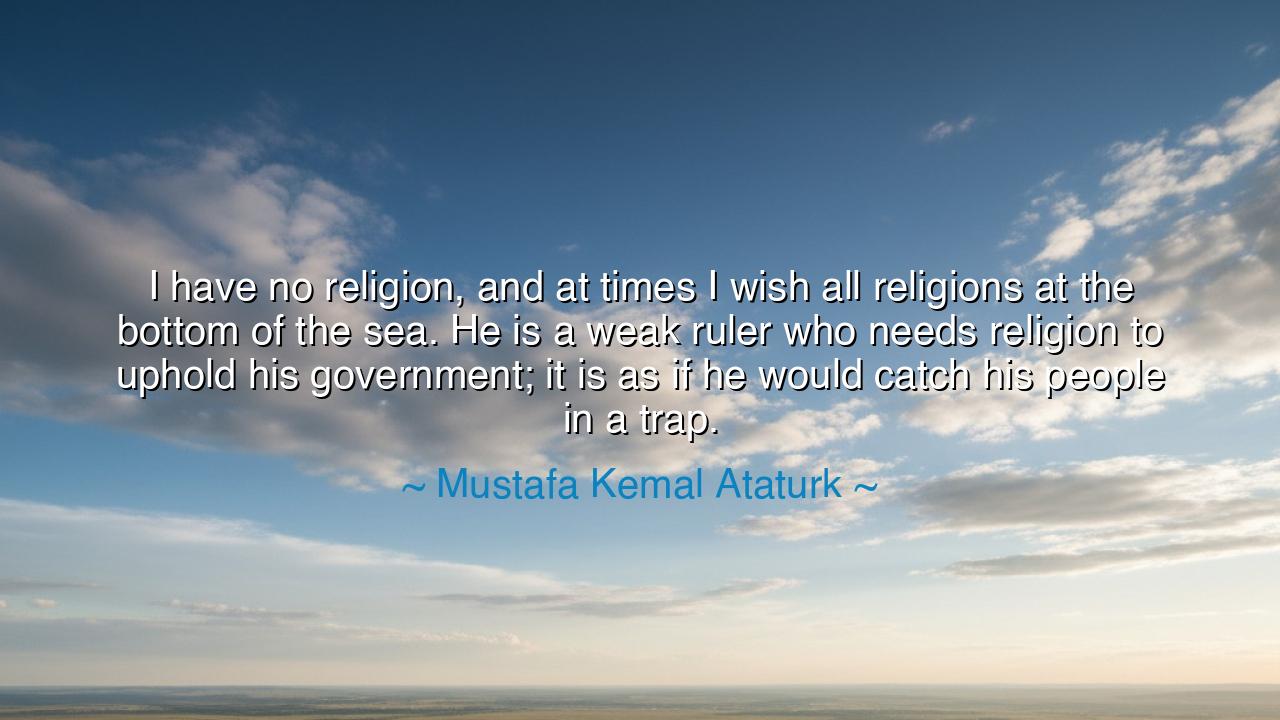
I have no religion, and at times I wish all religions at the
I have no religion, and at times I wish all religions at the bottom of the sea. He is a weak ruler who needs religion to uphold his government; it is as if he would catch his people in a trap.






In the dawn of a new century, when empires lay in ruin and nations sought to be reborn, Mustafa Kemal Atatürk, founder of modern Turkey, uttered words both fiery and fearless: “I have no religion, and at times I wish all religions at the bottom of the sea. He is a weak ruler who needs religion to uphold his government; it is as if he would catch his people in a trap.” These words, shocking to the pious and daring to the powerful, were not the cry of a godless man, but the declaration of a mind determined to free his people from the chains of blind obedience. He spoke as one who had seen with his own eyes how faith, when bound to politics, becomes a weapon in the hands of tyrants.
Atatürk was born into a world of decay — an empire trembling under the weight of superstition and stagnation. The Ottoman Empire, once vast and radiant, had become a shadow of itself, clinging not to progress but to the false comfort of dogma. Priests and sultans alike used religion not as a path to enlightenment but as an instrument of control, whispering to the people that obedience to rulers was obedience to God. Atatürk, soldier of reason and son of revolution, rose against that ancient order. He saw that true freedom could not be achieved while minds were bound by fear and souls were owned by priests. Thus he spoke with the courage of Prometheus, declaring that no government should be upheld by religion, for the ruler who must lean on the divine to maintain his rule is already weak in spirit and poor in virtue.
This truth was not born of blasphemy, but of wisdom hard-earned. History, like a mirror held to the ages, shows countless examples of rulers who have enslaved nations in the name of faith. Recall the dark times of the European Inquisition, when kings and clerics claimed to defend the soul but instead extinguished the light of thought. Or think of the wars fought under banners of holiness — the Crusades, the jihads, the purges — where millions perished not for justice, but for the ambitions of men who hid their greed behind sacred words. Atatürk saw in these patterns a timeless danger: when the throne and the altar unite, the people lose both their reason and their freedom.
Yet Atatürk was not against faith itself — he was against the use of faith as a trap. In his eyes, religion was a personal matter, a flame meant to warm the heart, not a chain to bind the mind. A ruler who governs by fear of divine punishment, he said, is like a fisherman who sets his nets in sacred waters, ensnaring souls rather than leading them. Such a leader may win obedience, but never respect; he may command silence, but never understanding. True strength lies not in manipulating belief, but in cultivating wisdom, education, and moral independence.
Consider his deeds, and not just his words. After the fall of the Ottoman Empire, Atatürk built a republic where the law was no longer dictated by the mullah or the monarch, but by the will of the people. He abolished the caliphate, reformed schools, elevated science above superstition, and proclaimed that the sovereignty belongs to the nation, not to divine decree. In doing so, he did not destroy faith — he purified it from the corruption of politics, returning it to the realm of conscience, where it belongs. Thus, he transformed a fallen empire into a modern nation, teaching that enlightenment, not obedience, is the truest path to salvation.
From his vision, we learn an eternal lesson: that reason must rule over fear, and knowledge must stand above dogma. Governments that rely on religion to justify their power do not serve God — they serve themselves. The wise ruler builds his authority upon justice, upon compassion, upon truth that can be questioned and proven. He invites his people to think, to learn, to grow — for only minds unafraid to question can ever be truly free.
So, my children of the future, take heed of Atatürk’s fire. Do not cast away faith if it brings you comfort, but never let it be used to enslave you. Cherish thought as sacred. Question everything that claims divine authority yet demands blind submission. For the world will always have those who seek to rule through fear — but their power ends the moment you open your eyes. Be as Atatürk was: fierce in reason, loyal to truth, and unafraid to stand alone. For freedom is not given by heaven, it is forged by the courage of the mind.






AAdministratorAdministrator
Welcome, honored guests. Please leave a comment, we will respond soon